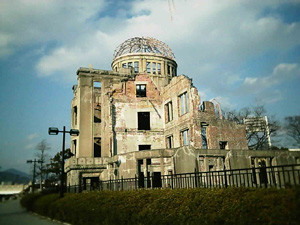August 6, 2015
Jeffrey Lewis
The following is an excerpt of an article that appeared on ForeignPolicy.com.
[…]This year is the 70th anniversary of the bombings, which feels like a big moment to take stock of where we are, how we’ve gotten here, and where we’re headed.
Hiroshima is a better place to do that thinking than Washington, D.C. The weather isn’t particularly nice in either place, but Washington’s August is doubly marred with nakedly ideological polemics on the bombing. You’ll hear that the bombings ended the war and saved millions of American lives, or that President Harry Truman knew the war was over and was just trying to frighten the Soviets, a move that starts the Cold War. I don’t think the historical evidence supports either view or even the stark duality both views presume, but what is really galling about these arguments is that the people of Hiroshima and Nagasaki are reduced to the role of mere extras at their own murders.
[…]It is easy to argue about the bombings with hindsight. We know the bombs worked and that they inflicted terrible suffering on the people of Hiroshima and then Nagasaki. Our entire modern debate about whether the bombings were intended to end the war or frighten the Soviets is premised on our contemporary conviction that nuclear weapons are awesome in the traditional sense of that word.
[…]Our modern conviction that nuclear weapons are different only came later. While the construction of the norm against nuclear weapons, I think pride of place goes to John Hersey’s Hiroshima. Originally published as a series of articles in the New Yorker, it was eventually published by Alfred A. Knopf press. The fact that I was assigned this text repeatedly in high school and college probably explains my choice of careers. I have a slim 1946 first edition that is one of my prize possessions.

